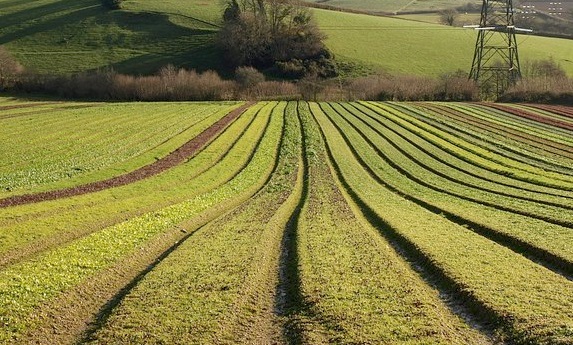
An alliance of 27 organisations today issued a statement challenging Rothamsted Research, the Government and funding bodies 'to be more open about the aims of the current GM wheat trials' and to justify their expenditure.
Wheat is the most important UK crop with an annual value of about £1.2 billion. Currently a large proportion of UK wheat is treated with broad spectrum chemical insecticides to control cereal aphids that reduce yields by sucking sap from plants and by transmitting barley yellow dwarf virus.
Repeated use of insecticides often leads to resistant aphids and kills other non-target insect species including the natural enemies of aphids, which could have a further impact on biodiversity.
Scientists at Rothamsted, funded by the UK Government through the Biotechnology and Biological Sciences Research(BBSRC) have been seeking ecological solutions to overcome this problem in wheat. One approach has been to use an odour, or alarm pheromone, which aphids produce to alert one another to danger.
In September 2011 Defra authorised Rothamsted’s GM wheat trial to test two versions of GM wheat genetically modified to emit aphid repelling pheromones in Spring 2012 and 2013.
An application to release the same GM wheat in Autumn 2013 is currently being considered by DEFRA. In addition Rothamsted asked Defra for authorisation to increase the permitted sowing rate for the Spring crops from 350 to 500 seeds per square metre following the poor establishment of the crop in 2012.
The change in the consent was approved in March 2013. The overall cost of developing the GM wheat and the trials has so far used £1.28 million of taxpayers’ money in the form of grants from the BBSRC.
Answers to Parliamentary Questions recently asked by Michael Meacher MP reveal that the GM traits in the wheat are already patented by private companies.
The recent discovery of GM contamination of wheat plants growing on an Oregon farm focuses attention on preventing contamination of non-GM and organic wheat, including if GM wheat is ever commercialised in the EU.
But Professor Maurice Moloney of Rothamsted Research said the challenge of feeding a rapidly increasing global population, in the face of a ‘perfect storm’ of rising food prices, climate change and pressure on the world’s natural resources, could not be met without access to innovation and new technology in agriculture.
This would require a shift in EU policy-making, he said, and a new recognition that modern intensive farming and environmental protection can go hand-in-hand as the most effective way to produce more food while conserving enough land to deliver biodiversity and other ecosystem services.
Speaking on behalf of CPA, Dr Julian Little of Bayer CropScience highlighted the damaging inflationary effects of spiralling food prices, and the vital role of technological innovation in keeping food costs down through higher yields and increased production efficiency.
Innovative new chemistry offered smarter solutions, he said, not only in controlling problem weeds and diseases, but also in boosting output - for example by allowing plants to remain greener for longer so promoting photosynthesis in the growing crop.
First generation farmer Robert Law, of Conservation Grade, said rising food prices and the impact of climate change had brought increased recognition of the growing food security crisis. Few people today questioned the need to ramp up production, but the key issue was how to do it.
Law said organic farming would not feed the world, but that GM technology – properly tested and without the current hype and hysteria – offered the potential to increase yields and reduce production costs.
Speaking after the fringe event, CPA communications manager Wendy Gray said: "This discussion has highlighted a growing recognition, among politicians, scientists, farmers and industry, that sustainable intensification in agriculture cannot be delivered without access to the latest advances in science and technology. The crop protection sector is leading a fresh debate about the need to re-think modern intensive agriculture and its role in providing a secure supply of safe, affordable, healthy food."
Commenting Pete Riley of GM Freeze said: "From the information currently available the scientific objectives if these GM trials are not at all clear, and the decision to publicly fund the project was not made in an open or transparent manner. There is currently no GM wheat grown commercially anywhere on the planet, and we feel Rothamsted and the BBSRC need to explain why this project took priority over other non-GM agriculture research projects that could be have delivered benefits more quickly while commanding public support."
Lawrence Woodward of Citizens Concerned about GM added: "One of the most frustrating aspects of the GM wheat project is that a large body of research on creating farm environments that attract natural predators and parasites of aphids into crops has been ignored. If there was funding to ensure these were widely established on the UK’s arable farmers there would many other benefits for farmland birds and mammals, pollinating insects, landscape and for increasing soil organic matter. The public needs better and more transparent explanations as to where their money is being spent, why and who will benefit in the long term if the GM wheat is ever commercialised."
Conservative MP George Freeman said not enough is being done to unlock the UK's agricultural science base in a world hungry for food.
The MP told delegates at the Crop Protection Association fringe meeting in Birmingham last year.
As Britain looks to trade itself out of a debt crisis, he said access to scientific innovation would be vital not only to support a competitive food and farming sector at home, but also to drive technology-based exports and attract inward investment from emerging global agricultural economies in countries such as Brazil, China and India.
